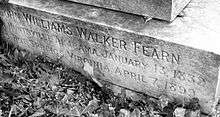Walker Fearn
| John Walker Fearn | |
|---|---|
 | |
| Born |
January 13, 1832 Huntsville, Alabama, USA |
| Died |
April 7, 1899 (aged 67) Hot Springs, Virginia, USA |
| Nationality | American |
| Occupation | American diplomat |
| Spouse(s) | Frances Hewitt |
| Parents |
|
John Walker Fearn (January 13, 1832 – April 7, 1899)[1][2] was a Confederate and American diplomat.
Early life
Fearn, born in Huntsville, Alabama,[2] was an 1851 graduate of Yale University.[3] He was the nephew of LeRoy Pope Walker, the first Secretary of War of the Confederacy.[4]
Following Yale University, Fearn continued to study law and was admitted to the Mobile bar in 1853.[5]
Career
He spent most of the 1850s on the staffs of the American embassies in Belgium and Mexico, then joined the Confederate diplomatic corps when the Civil War broke out in 1861.[6] While in Europe, he attended the lectures of the College de France in Paris. After serving on unsuccessful missions to Spain, France, Russia, and Mexico, Fearn moved to New Orleans when the war was over to practice law.[7]

From 1885 to 1889, Fearn served as the American minister to Serbia, Romania, and Greece.[1] He later served as chief of the Department of Foreign Affairs for the World's Columbian Exposition in Chicago in 1893.[8]
According to his biography in Yale's Confederates: "Fearn, having been prepared in Mobile at the academy of Dr. Norman Pinney, entered YC at age sixteen and graduated with "distinguished honors." He went back to Mobile, read law with future court justice John A. Campbell, and was admitted to the local bar on his twenty-first birthday. Quite soon he practiced before the U.S. Supreme Court. A lover of travel and a student of languages, Walker happily accepted the offer to become secretary of the legation to Brussels in 1853, and used the opportunity to listen to international law lectures in Paris, before becoming secretary of the legation to Mexico, where he would work closely with the minster, John Forsyth, the journalist. In Mexico, Walker gained attention as an explorer, ascending Iztaccihuatl and Popocatreperl. His account of descending into the crater of the latter volcano gained widespread publication and attention. Next, according to the class secretary, came an extended trip with his father, when he "spent several years looking to every nook and corner of Europe." In 1861, before the war broke out, Fearn was a member of a Confederate commission "to induce the peaceful intervention of foreign powers." Fort Sumter dashed these hopes, and upon his return from Europe Walker had to run the blockade under fire with his charge being "eleven hundred barrels of explosive." Soon safe in Richmond, he was appointed a lt. col. on the staff of Gen. Joseph E. Johnston, but this was soon set aside so he might accompany L.Q.C. Lamar to Russia as secretary. When the Czar refused to receive Lamar, Fearn returned to the U.S. and joined the staff of Gen. William Preston. He and Preston, however, were soon sent to Mexico on yet another failed diplomatic mission. Late in the war he would again be in the field, this time as an AAG to Edmund Kirby Smith. At war's end, Fearn settled in New Orleans and devoted himself to admiralty law. In 1884, he could not resist, however, the offer of the chair of Spanish and Italian at the new Tulane University, but his appointment as U.S. Minister to Greece, Romania, and Serbia in April 1885, would pluck him from academic life. In 1887, with the change of administrations, he established an international law firm with offices in London and New York City, remaining until 1891, when he became chief of the Dept. of Foreign Affairs of the World's Fair in Chicago. When the fair closed, President Grover Cleveland appointed Fearn a judge of the court of first instance on the International Tribunal in Cairo, Egypt. Before he left, fortunately, Yale recognized his attainments with an honorary M.A.
Fearn would return to America in failing health and died not long after.
Thomas C. DeLeon, who knew the young man in Mobile, saw Walker as a "courtly, gifted and accomplished man, who gave earnest of the later high acquirement which made him a marked type of the southern gentleman and diplomatist."[9]
Personal life
John Walker Fearn married Frances Hewitt of Louisville in 1865. They had four children including Mary Walker, Percy Le Roy, James Hewitt and Clarice Hewitt.[5]
Their daughter Mary Walker married Prince Serge Wolkonsky.
John Walker Fearn died on April 7, 1899.[5]
References
- 1 2 "John Walker Fearn - People - Department History - Office of the Historian". history.state.gov. Retrieved 19 January 2014.
- 1 2 Lawrence Kestenbaum. "The Political Graveyard: Index to Politicians: Fayad to Fehrman". politicalgraveyard.com. Retrieved 19 January 2014.
- ↑ Onofrio, Jan. Alabama Biographical Dictionary, pg. 112
- ↑ "William Lowndes Yancey and the Coming of the Civil War, p.304".
- 1 2 3 "Huntsville History Collection".
- ↑ Onofrio, pg. 112
- ↑ Onofrio, pg. 112-13
- ↑ Onofrio, pg. 113
- ↑ "Yale's Confederates: A Biographical Dictionary, p.70".